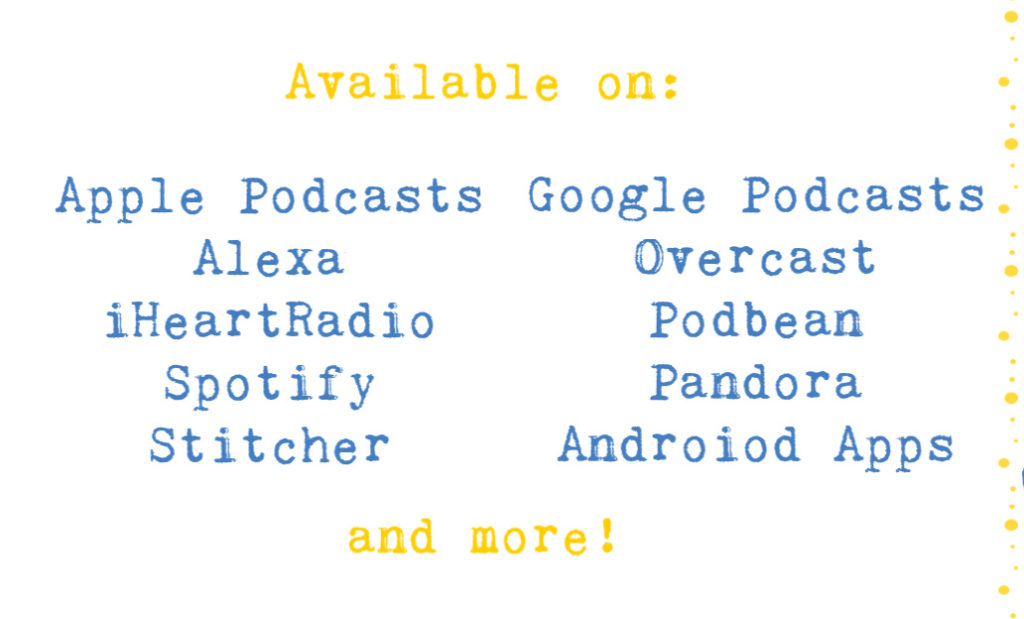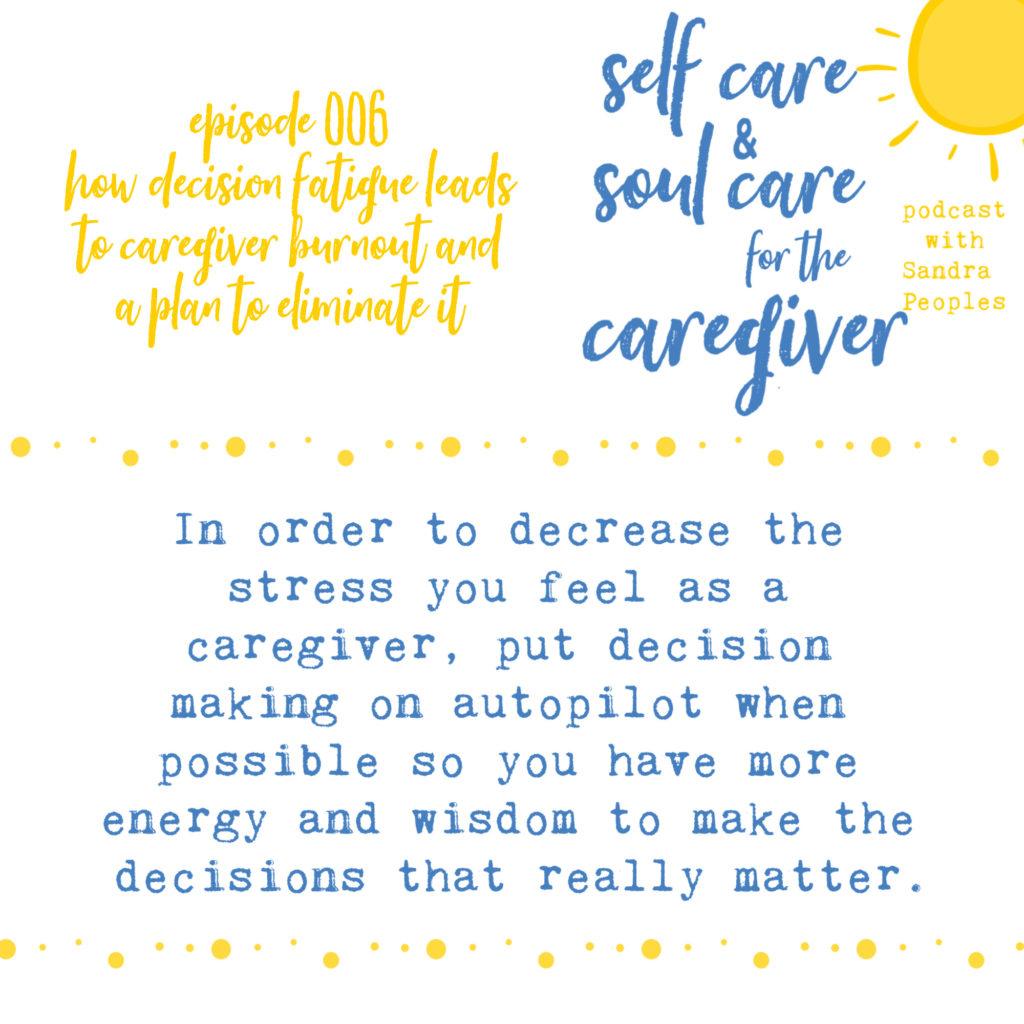Today’s topic is a big one—decision fatigue. Have you heard the phrase before? Whether it’s a new concept to you or one you’re very familiar with, I hope today’s episode makes your life as a caregiver easier.
This month I’m going over 4 topics that I think are the most important for us. Last week in episode 5 we talked about having a purpose statement. Why is it so important? Because you use it to know yourself and your purpose better, and it helps you make big decisions. Today we’re talking about small decisions and eliminating those so we have more brain power for the big ones.
If you and your husband have ever had a discussion that included the words, “I don’t know what I want for dinner. You decide” at 5:05, you’re probably suffering from decision fatigue. Let’s jump into more details about decision fatigue and the plan to eliminate it!
Listen to Self Care and Soul Care for the Caregiver on iTunes or the link at the end of the post.

Quick links from the episode:
- Better Than Before by Gretchen Rubin (affiliate link)
- SandraPeoples on Instagram

Transcript:
This is self care and soul care for the care giver, and I’m your host—Sandra Peoples. To us, self care isn’t a luxury, it’s a necessity. We want to take better care of ourselves so we’re able to care for our loved ones who rely on us.
Today’s topic is a big one—decision fatigue. Have you heard the phrase before? Whether it’s a new concept to you or one you’re very familiar with, I hope today’s episode makes your life as a caregiver easier.
This month I’m going over 4 topics that I think are the most important for us. Last week in episode 5 we talked about having a purpose statement. Why is it so important? Because you use it to know yourself and your purpose better, and it helps you make big decisions. Today we’re talking about small decisions and eliminating those so we have more brain power for the big ones.
If you and your husband have ever had a discussion that included the words, “I don’t know what I want for dinner. You decide” at 5:05, you’re probably suffering from decision fatigue. Let’s jump into more details about decision fatigue and the plan to eliminate it!
The average person makes 35,000 decisions a day. But caregivers make thousands more than the average, leading to the additional stress of decision fatigue.

Our decision making begins as soon as we wake up. Do I hit snooze or jump out of bed? Do I try to take a shower before my son wakes up or wait until after I drop him off at therapy? What should I wear? What should I have for breakfast?
Some of these decision are the same ones most moms make each day. But because my twelve-year-old son is functionally nonverbal and needs significant help, I’m not only making decisions for myself, I’m making them for him as well. What will he wear? What will he have for breakfast? What will I pack for his lunch? Which book will I put in his backpack for him to look at on the bus?
This extra decision making isn’t just for a season of our lives—this will be true for the foreseeable future. And it’s one of the top contributors to caregiver stress and burnout. Let’s be honest – Making decision after decision is exhausting. We reach a point when we just can’t do it. That’s the “what do you want for dinner?” “I don’t know, what do you want for dinner?” conversation I was talking about earlier.
So what’s the solution? We can take steps to eliminate some of the decisions we make.
Studies claim we repeat about 40% of our behavior almost daily. You probably eat lunch at the same time each day. You sit in the same seats at church each Sunday. You order the same meal at your favorite restaurant. I even text one of my friends at the same times each day (8:00ish am and 8:00ish pm to see what she had planned for the day and then see how it went). You aren’t making these decisions every time because you’ve already figured out what works for you and you just repeat it.
To eliminate fatigue and burnout, make the best decision you can and then repeat it. As Gretchen Rubin wrote in her book Better Than Before, “I should make one healthy choice, and then stop choosing.”
You can do this by keeping a journal of all the decisions you make each day and try to eliminate as many of them as you can. Or you can just pay attention to the patterns in your day and figure out what you can repeat.
I wear the same shirt every Monday so I don’t have to think about what I’m going to put on when we’re all in a hurry to get out of the house. On Sunday nights I meal plan for the week so I don’t have to think about it at 4:30 pm when I’m experiencing the fatigue that comes from making decisions all day long. At 9:00 pm I get off my phone and read a book instead so I don’t have to decide when to stop scrolling. I make the same thing for James’s lunch every day (thankfully, he’s a big fan of a solid routine).
In episode 7 we’re going to talk about creating an ideal week. You write out exactly what you would do every hour of the week if everything went the way you would want it to go. The process helps me eliminate decision fatigue because I can look at my ideal week and see what I should be doing at 9:00 am on a Monday or 2:30 on Thursday afternoon.
Eliminating decision fatigue is especially important because we have unpredictable lives. Some of you don’t know each morning when you wake up if it will be a day someone ends up in the hospital. Or you’ll get a call from the school to help them navigate a challenge. If any part of your schedule is on autopilot, it helps you manage stressful situations even better. You can fall back on your routine when life is extra hectic.
Paying attention to the decision fatigue others have is also helpful. A few years ago when we lived in Pennsylvania, we had just bought a new house and had moved. The boys were both little and home with me full time. So unpacking wasn’t easy to do with them getting into everything. Then one morning we got a call that my grandmother in Oklahoma had passed away. I had to pause trying to get the new house livable and plan for a trip to Oklahoma. Stress plus grief was not a good combination.
My friend Nikki asked what she could do to help, and I just started bawling. I did not have the capacity to answer her question. I didn’t know what mypriorities were, so I couldn’t think of what I needed most. Instead, she came up with the answer for me. She said, “Bring me your dirty clothes.” She washed them, dried them, and folded them. All I had to do was put them in our suitcases and we were ready to go.
When we get good at eliminating decision fatigue, it helps us be better friends to others who are going through a hard time. We know not to ask them “how can I help?” but instead make that decision for them. Maybe you’ll say, “I’ll bring dinner over on Wednesday because I know that’s your busy night” or “I’ll pick up your kids on our way to story time at the library so you can get a break.” Take the pressure off by not asking someone in a crisis situation to make yet another decision.
To sum up what we’ve talked about today, I leave you with this:
In order to decrease the stress you feel as a caregiver, put decision making on autopilot when possible so you have more energy and wisdom to make the decisions that really matter.

In the coming weeks, we’re going to get even more detailed about how to do this, including having a Monday uniform, a routine for cleaning the house, a menu planning guide, and even how to speed up or slow down time based on the decisions you make. Be sure to subscribe so you don’t miss any episodes!
Let’s end our time today in prayer as you take these steps toward eliminating decision fatigue: God, You bring peace to our lives even when our days feel hectic. We are asking today for Your wisdom as we make the best decisions we can and then repeat those decisions in the coming days. You know the number of hairs on our heads and the number of decisions we make each day. Please guide our thoughts, intentions, and the results. We want to honor you and love our families well, especially during stressful times. In Jesus’ name we pray, amen.
Over on sandrapeoples.com/thepodcast you can check out a transcript of the show and see the show notes. Just click on episode 6. In Instagram stories this week, I’ll be pointing out ways I eliminate decision fatigue, so follow me there. My username is SandraPeoples.
Remember, self-care isn’t selfish. It’s important for us to take care of ourselves so we can care for the loved ones God has entrusted to us. Thanks for listening and I’ll meet you back here next Monday!


